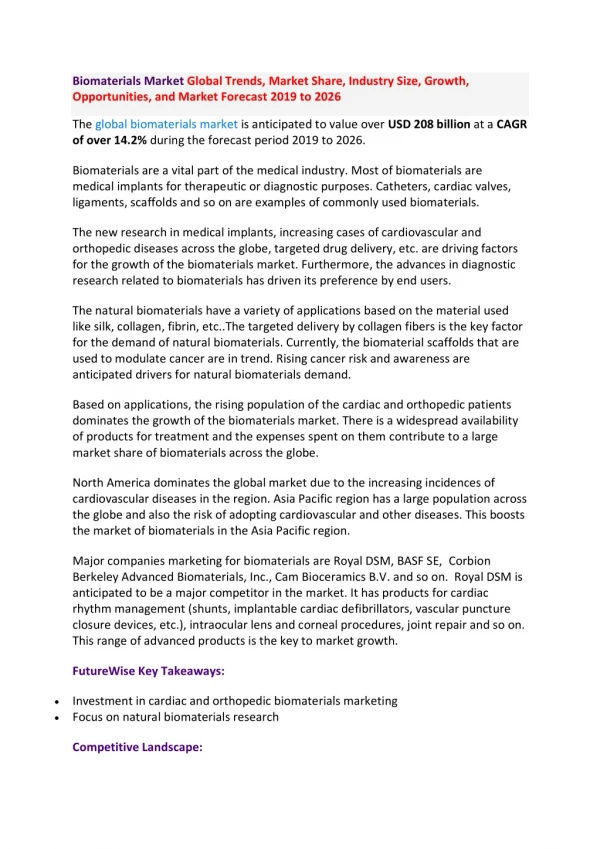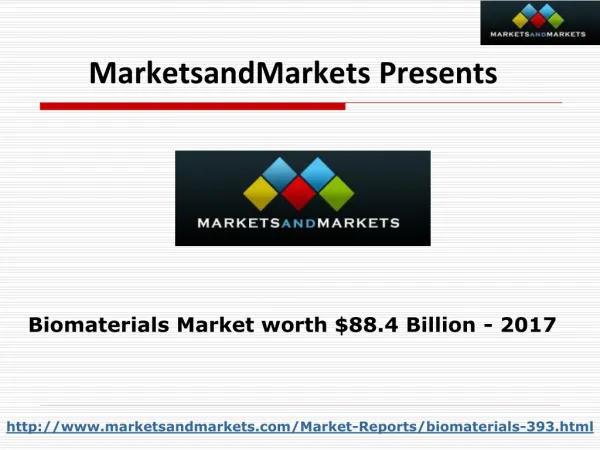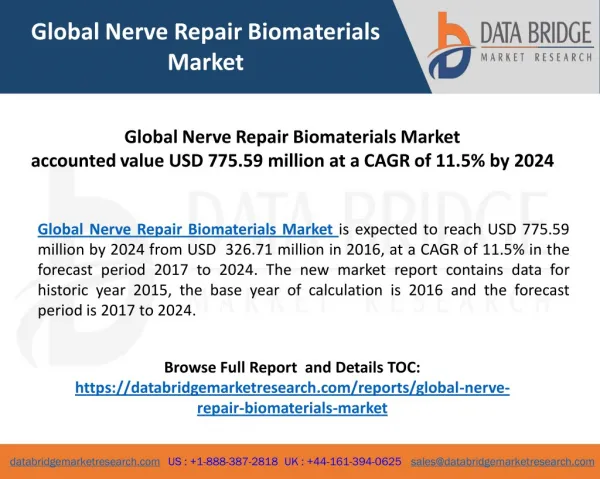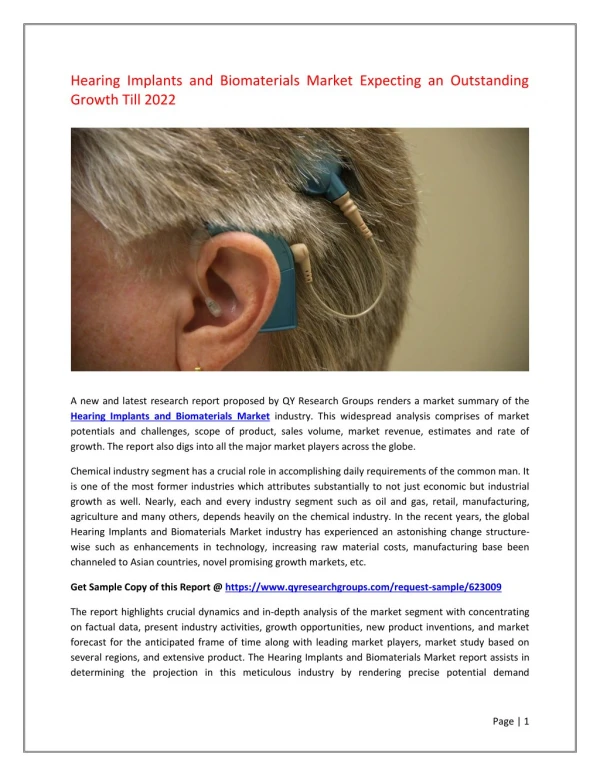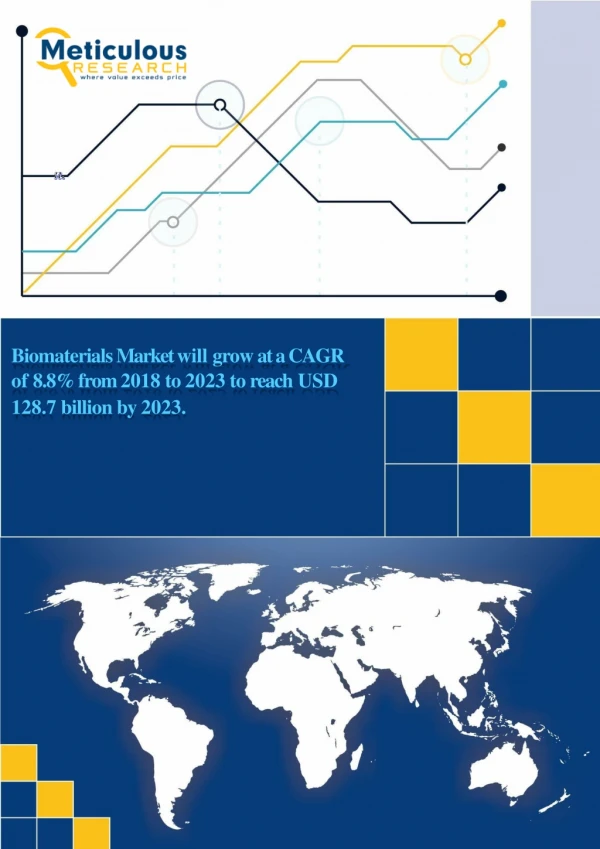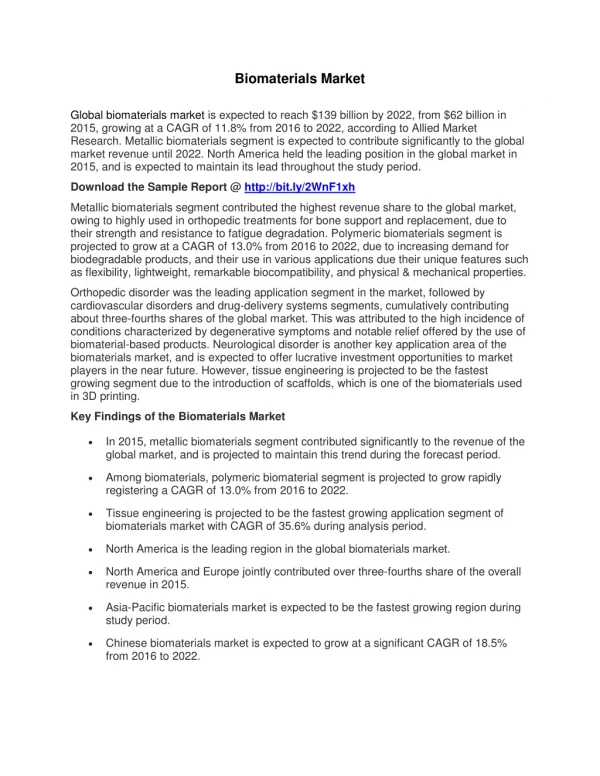Biomaterials Market Global Trends, Market Share, Industry Size, Growth, Opportunities, and Market Forecast 2019 to 2026
The global biomaterials market is anticipated to value over USD 208 billion at a CAGR of over 14.2% during the forecast period 2019 to 2026. Biomaterials are a vital part of the medical industry. Most of biomaterials are medical implants for therapeutic or diagnostic purposes. Catheters, cardiac valves, ligaments, scaffolds and so on are examples of commonly used biomaterials. The new research in medical implants, increasing cases of cardiovascular and orthopedic diseases across the globe, targeted drug delivery, etc. are driving factors for the growth of the biomaterials market. Furthermore, the advances in diagnostic research related to biomaterials has driven its preference by end users. The natural biomaterials have a variety of applications based on the material used like silk, collagen, fibrin, etc..The targeted delivery by collagen fibers is the key factor for the demand of natural biomaterials. Currently, the biomaterial scaffolds that are used to modulate cancer are in trend. Rising cancer risk and awareness are anticipated drivers for natural biomaterials demand. Based on applications, the rising population of the cardiac and orthopedic patients dominates the growth of the biomaterials market. There is a widespread availability of products for treatment and the expenses spent on them contribute to a large market share of biomaterials across the globe. North America dominates the global market due to the increasing incidences of cardiovascular diseases in the region. Asia Pacific region has a large population across the globe and also the risk of adopting cardiovascular and other diseases. This boosts the market of biomaterials in the Asia Pacific region. Major companies marketing for biomaterials are Royal DSM, BASF SE, Corbion Berkeley Advanced Biomaterials, Inc., Cam Bioceramics B.V. and so on. Royal DSM is anticipated to be a major competitor in the market. It has products for cardiac rhythm management (shunts, implantable cardiac defibrillators, vascular puncture closure devices, etc.), intraocular lens and corneal procedures, joint repair and so on. This range of advanced products is the key to market growth. FutureWise Key Takeaways: * Investment in cardiac and orthopedic biomaterials marketing * Focus on natural biomaterials research Competitive Landscape: * Tier 1 players- established companies in the market * Laboratories and Agilent Technologies, Inc. with a major market share * Tier 2 players * Emerging players which are growing rapidly * New Entrants Request a Sample Report @ https://www.futurewiseresearch.com/request-sample.aspx?id=3363&page=requestsample Global Biomaterials Market Segmentation: By Type: * Metallic * Polymeric * Ceramic * Natural biomaterials By Application: * Cardiovascular * Orthopedic * Ophthalmology * Dental * Plastic surgery * Wound healing * Tissue engineering * Neurological/ central nervous system applications * Other applications By Region: * North America * Europe * Asia Pacific Purchase a Copy of this Premium Research Report & Ask For Discount: https://www.futurewiseresearch.com/request-sample.aspx?id=3363&page=askfordiscount Objectives of the Study: * To provide with an exhaustive analysis on the biomaterials market by type, by application and by region * To cater comprehensive information on factors impacting market growth (drivers, restraints, opportunities, and industry-specific restraints) * To evaluate and forecast micro-markets and the overall market * To predict the market size, in key regions (along with countries)u2014 North America, Asia Pacific and Europe * To record evaluate and competitive landscape mapping- product launches, technological advancements, mergers and expansions * Profiling of companies to evaluate their market shares, strategies, financials and core competencies Table of Contents 1 Introduction 1.1 Objectives of Study 1.2 Market Definition 1.2.1 Markets Covered 1.2.2 Years Considered for the Study 1.3 Currency 1.4 Limitations 1.5 Stakeholders 2 Research Methodology 2.1 Research Methodology Steps 2.2 Research Design 2.3 Secondary Data 2.3.1 Primary Data 2.3.1.1 Key Data From Primary Sources 2.3.1.2 Key Industry Insights 2.4 Market Size Estimation Methodology 2.5 Market Data Validation and Triangulation 2.6 Assumptions for the Study: 3 Executive Summary 4 Vital Insights 4.1 Biomaterials Market Overview 4.2 Biomaterials Market, By Type, 2018 (USD Billion) 4.3 Biomaterials Market: Geographic Snapshot 5 Market Overview 5.1 Introduction 5.2 Market Dynamics 5.2.1 Drivers 5.2.1.1 Increased Funds and Grants By Government Bodies and Universities for the Development of Novel Biomaterials 5.2.1.2 Increasing Demand for Implantable Devices 5.2.1.3 Growing Demand for Biomaterials in Plastic Surgery and Wound Healing Applications 5.2.1.4 Rising Incidence of Cardiovascular Diseases 5.2.1.5 Increasing Research on Regenerative Medicine 5.2.2 Restraints 5.2.2.1 Stringent Clinical & Regulatory Processes 5.2.2.2 Unfavorable Healthcare Reforms in the US 5.2.3 Opportunities 5.2.3.1 Growing Healthcare Market in Emerging Economies 5.2.3.2 Increasing Number of Free-Trade Agreements 5.2.4 Challenges 5.2.4.1 Limitations of Biomaterial-Based Products 5.2.4.2 Shortage of Skilled Surgeons 6 Regulatory Assessment 6.1 Introduction 6.2 US 6.2.1 Introduction 6.2.2 Fda Device Classification 6.2.3 US: Regulatory Approval Timeline Assessment 6.2.4 Stringent Fda Regulations Governing Product Approvals 6.3 Canada 6.3.1 Introduction 6.3.2 Canada: Regulatory Approval Timeline Assessment 6.3.3 Health Canada Classification 6.4 Europe 6.4.1 Introduction 6.4.2 European Medical Device Classification 6.4.3 Europe: Regulatory Approval Timeline Assessment 6.4.4 European Regulatory Process to Get More Stringent in Future 6.5 Japan 6.5.1 Introduction 6.5.2 Pmda Device Classification 6.5.3 Japan: Regulatory Approval Timeline Assessment 6.5.4 Revision of the Pharmaceutical Affairs Law (PAL) and Implementation of the New Pmd Act in Japan 6.6 China 6.6.1 Introduction 6.6.2 Cfda Device Classification 6.6.3 China: Regulatory Approval Timeline Assessment 6.6.4 Rising Hurdles in the Regulatory Process in China 6.7 India 6.7.1 Introduction 6.7.2 Indian Medical Devices Classification 6.8 Australia 6.8.1 Introduction 6.8.2 Tga Device Classification 6.8.3 Australia: Regulatory Approval Timeline Assessment 7 Biomaterials Market, By Type 7.1 Introduction 7.2 Metallic Biomaterials 7.2.1 Stainless Steel 7.2.1.1 Stainless Steel Dominates the Metallic Biomaterials Market 7.2.2 Titanium & Titanium Alloys 7.2.2.1 Rising Number of Joint Replacement Procedures Will Drive the Market for Titanium Biomaterials 7.2.3 Cobalt-Chrome Alloys 7.2.3.1 Low Cost and Excellent Corrosion Resistance have Driven the Use of Cobalt-Chrome Alloys 7.2.4 Gold 7.2.4.1 Expanding Applications of Gold Nanoparticles to Drive the Demand for Gold Biomaterials 7.2.5 Silver 7.2.5.1 Toxic Properties and Low Aesthetic Appeal Likely to Limit the Use of Silver in Biomaterial-Based Products 7.2.6 Magnesium 7.2.6.1 Biodegradable Characteristic of Magnesium have Stimulated the Growth of This Market Segment 7.3 Polymeric Biomaterials 7.3.1 Polymethylmethacrylate 7.3.1.1 Pmma Dominates the Polymeric Biomaterials Market 7.3.2 Polyethylene 7.3.2.1 Wear and Tear Resistance of Polyethylene have Made It Popular in Hip and Knee Joint Replacements 7.3.3 Polyester 7.3.3.1 Biodegradable Nature and Biocompatibility of Polyester Will Drive Its Use in Various Medical Applications 7.3.4 Polyvinylchloride 7.3.4.1 Heavy Chlorine Content of Pvc is Likely to Hamper the Market Growth 7.3.5 Silicone Rubber 7.3.5.1 Silicone Rubbers are Non-Reactive, Stable, and Resistant to Extreme Environments and Temperatures 7.3.6 Nylon 7.3.6.1 Nylonu2019s Low Weight, Corrosion Resistance, and Wide Applications are Expected to Drive Market Demand 7.3.7 Polyetheretherketone 7.3.7.1 Peek is Gaining Popularity as A Viable Alternative to Metals 7.3.8 Other Polymeric Biomaterials 7.4 Ceramics 7.4.1 Calcium Phosphate 7.4.1.1 Calcium Phosphate Drives Ceramic Biomaterial Market Segment 7.4.2 Zirconia 7.4.2.1 Bio-Inertness and Low Wear Rate of Zirconia Will Boost the Market Growth 7.4.3 Aluminum Oxide 7.4.3.1 Increasing Use of Aluminum Oxide in Hip Replacements and Dental Implants to Drive the Market 7.4.4 Calcium Sulfate 7.4.4.1 Fast Resorption Rate of Calcium Sulfate is Likely to Hamper Its Use 7.4.5 Carbon 7.4.5.1 Increasing Use of Carbon Nanofibers in Regenerative Medicine and Cancer Treatment Will Drive Market Growth 7.4.6 Glass 7.4.6.1 Rising Number of Orthopedics and Dental Procedures Likely to Drive the Demand for Glass Biomaterials 7.5 Natural Biomaterials 7.5.1 Hyaluronic Acid 7.5.1.1 Rising Prevalence of Osteoarthritis to Drive Hyaluronic Acid Market 7.5.2 Collagen 7.5.2.1 Rising Prevalence of Target Applications to Drive Growth in Collagen Market 7.5.3 Gelatin 7.5.3.1 Low Cost of Gelatin to Drive Its Market Growth 7.5.4 Fibrin 7.5.4.1 Fibrin Biomaterials Were Among the First Used to Prevent Bleeding 7.5.5 Cellulose 7.5.5.1 Cellulose Find Applications in Wound Healing, Skin Regeneration, and Ophthalmology 7.5.6 Chitin 7.5.6.1 Chitin Accelerates Skin Regeneration and Possesses High Biocompatibility 7.5.7 Alginates 7.5.7.1 Various Applications of Alginates Include Wound Healing, Tissue Engineering & Regenerative Medicine, and Drug Delivery 7.5.8 Silk 7.5.8.1 The Flexibility, Glossiness, and Adhesive Abilities of Silk have Made It Popular in Cosmetic Applications 8 Biomaterials Market, By Application 8.1 Introduction 8.2 Cardiovascular 8.2.1 Catheters 8.2.2 Stents 8.2.3 Implantable Cardiac Defibrillators 8.2.4 Pacemakers 8.2.5 Sensors 8.2.6 Heart Valves 8.2.7 Vascular Grafts 8.2.8 Guidewires 8.2.9 Others 8.3 Orthopedic 8.3.1 Joint Replacement 8.3.1.1 Knee Replacement 8.3.1.2 Hip Replacement 8.3.1.3 Shoulder Replacement 8.3.1.4 Others 8.3.2 Viscosupplementation 8.3.3 Bioresorbable Tissue Fixation 8.3.3.1 Suture Anchors 8.3.3.2 Interference Screws 8.3.3.3 Meniscal Repair Tacks 8.3.3.4 Meshes 8.3.4 Spine 8.3.4.1 Spinal Fusion Surgeries 8.3.4.2 Minimally Invasive Fusion Surgeries 8.3.4.3 Motion Preservation & Dynamic Stabilization Surgeries 8.3.4.3.1 Pedicle-Based Rod Systems 8.3.4.3.2 Interspinous Spacers 8.3.4.3.3 Artificial Discs 8.3.5 Fracture Fixation Devices 8.3.5.1 Bone Plates 8.3.5.2 Screws 8.3.5.3 Pins 8.3.5.4 Rods 8.3.5.5 Wires 8.3.6 Synthetics Bone Grafts 8.4 Ophthalmology 8.4.1 Increasing Prevalence of Eye Diseases to Drive Market Growth 8.4.2 Contact Lenses 8.4.3 Intraocular Lenses 8.4.4 Functional Replacement of Ocular Tissues 8.4.5 Synthetic Corneas 8.4.6 Others 8.5 Dental 8.5.1 Synthetic Dental Biomaterials Include Metals, Ceramics, Polymers, and Composite Structures 8.5.2 Dental Implants 8.5.3 Dental Bone Grafts & Substitutes 8.5.4 Dental Membranes 8.5.5 Tissue Regeneration 8.6 Plastic Surgery 8.6.1 Growing Number of Cosmetic Surgeries Performed to Drive the Market for Biomaterials 8.6.2 Soft-Tissue Fillers 8.6.3 Craniofacial Surgery 8.7 Wound Healing 8.7.1 Biomaterials are Extensively Used in Various Wound Healing Products 8.7.2 Wound Closure Devices 8.7.2.1 Sutures 8.7.2.2 Staples 8.7.3 Surgical Hemostats 8.7.4 Internal Tissue Sealants 8.7.5 Adhesion Barriers 8.7.6 Hernia Meshes 8.8 Tissue Engineering 8.8.1 Increasing Demand for Enhanced Mechanical Performance of Tissue-Engineered Implants to Support the Growth of This Application Segment 8.8.2 Scaffolds for Regenerative Medicine 8.8.3 Nanomaterials for Biosensing 8.8.4 Tailoring of Inorganic Nanoparticles 8.9 Neurological/Central Nervous System Applications 8.9.1 The Major Application Areas of Biomaterials in Cns Disorders Include Shunting, Cortical Neural Prosthesis, and Neural Stem Cell Encapsulation 8.9.2 Shunting Systems 8.9.3 Cortical Neural Prosthetics 8.9.4 Hydrogel Scaffolds for Cns Repair 8.9.5 Neural Stem Cell Encapsulation 8.10 Other Applications 8.10.1 Drug Delivery Systems 8.10.2 Gastrointestinal Applications 8.10.3 Bariatric Surgery 8.10.4 Urinary Applications 9 Biomaterials Market, By Region 9.1 Introduction 9.2 North America 9.2.1 US 9.2.1.1 US Dominates the North American Biomaterials Market 9.2.2 Canada 9.2.2.1 Increasing Incidence of Cardiovascular Diseases to Drive Market Growth in Canada 9.3 Europe 9.3.1 Germany 9.3.1.1 Large Medical Devices Market to Support the Adoption of Biomaterials in Germany 9.3.2 UK 9.3.2.1 Availability of Funds and Rising Cardiovascular Procedures to Drive the Biomaterials Market in the UK 9.3.3 France 9.3.3.1 Rising Aging Population and Associated Diseases to Drive the Market in France 9.3.4 Spain 9.3.4.1 Increasing Research Activities on Biomaterials to Drive the Growth in Spain 9.3.5 Rest of Europe (RoE) 9.4 Asia Pacific 9.4.1 Japan 9.4.1.1 Growing Medical Devices Industry to Drive Market Growth 9.4.2 China 9.4.2.1 Lucrative Medical Devices Industry in China 9.4.3 India 9.4.3.1 Large Population Base and Growing Medical Tourism in India to Drive the Growth of Biomaterials 9.4.4 Rest of Asia Pacific (RoAPAC) 9.5 Rest of the World (RoW) 10 Competitive Landscape 10.1 Overview 10.2 Competitive Scenario 10.2.1 Product Launches 10.2.2 Mergers and Acquisitions 10.2.3 Expansions 10.3 Competitive Leadership Mapping (Overall Market) (2018) 10.3.1 Visionary Leaders 10.3.2 Innovators 10.3.3 Dynamic Differentiators 10.3.4 Emerging Companies 10.4 Competitive Leadership Mapping (New Entrants) (2018) 10.4.1 Progressive Companies 10.4.2 Starting Blocks 10.4.3 Dynamic Companies 10.4.4 Responsive Companies 11 Company Profiles (Introduction, Products & Services, Strategy, & Analyst Insights, Developments, FutureWise Expert Perspective)* 11.1 Royal DSM 11.2 BASF SE 11.3 Corbion 11.4 Covestro AG 11.5 Carpenter Technology Corporation 11.6 Evonik Industries 11.7 Berkeley Advanced Biomaterials, Inc. 11.8 Cam Bioceramics B.V. 11.9 Celanese Corporation 11.10 CoorsTek Inc. 11.11 CeramTec GmbH 11.12 GELITA AG *Details on FutureWise Key Insights, Introduction, Product & Services, Strategy, & Analyst Insights, New Developments Might Not Be Captured in Case of Unlisted Companies. 12. Recommendations and Acronyms 13. Research Methodology Inquire further details about this report at: sales@futurewiseresearch.com About FutureWise Research: We specialise in high-growth niche markets, assuring flexibility, agility and customised solutions for our clients. Through in-depth market insights and consultancy, we present our clients with the tools they need to be at the forefront of their industry u2013 a position secured for far more than the near future. Contact Us: Company Name: FutureWise Research Contact Person: Vinay Thaploo Email: sales@futurewiseresearch.com Phone: 44 141 628 9353 / 1 970 279 4295 City: Leeds Country: United Kingdom Website: www.futurewiseresearch.com
★
★
★
★
★
166 views • 16 slides

